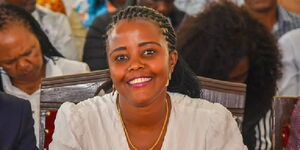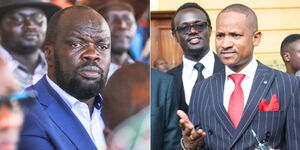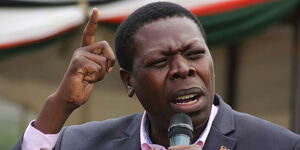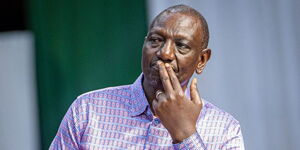The curtains have fallen on the Kenya Certificate of Primary Education (KCPE), signalling a milestone in Kenya’s transition to a new education curriculum.
2023 KCPE candidates will gradually phase out the 8-4-4 education system when they complete their higher education studies, eight years from now.
Behind them are the pioneers of the 2-6-3-3-3 Competency-Based Curriculum (CBC), which consists of pre-primary, primary, junior secondary, senior secondary, and higher education.
The country is still coming to terms with the particulars of the new system as the Ministry of Education steers the wheels of the CBC ship.
Reminiscing on the old curriculum being gradually phased out, we look at the Ministers of Education who oversaw the 8-4-4 system.
Peter Oloo Aringo - (1986-1989, 1994, 2001)
Peter Oloo was the Minister for Education when the 8-4-4 curriculum was introduced. Aringo proposed bills in the national assembly, which saw Moi, Maseno, and Egerton universities become public institutions.
He also helped draft a policy to establish institutes of technology in the eight provinces, namely Nairobi, Eastern, Western, Rift Valley, Nyanza, Central, North Eastern, and Coast. Some of the institutes that were established include Rift Valley, Dedan Kimathi, Western, Ramogi, and Coast technical institutes.
Aringo faced challenges implementing the then-new 8-4-4 system because students were not getting the envisaged technical training.
Few science teachers were graduating from the Kenya Science Teachers’ College, so Aringo fronted the creation of Kenya Technical Trainers’ College (KTTC) to produce more teachers specializing in technical courses.
Kalonzo Musyoka - 1998-2001
In his first year as Minister for Education, Kalonzo Musyoka instituted a commission to review the 8-4-4 system, focusing on its strengths and weaknesses with the aim of strengthening education at the primary and secondary levels.
Education stakeholders had complained that the relatively new 8-4-4 curriculum was more theoretical than practical and that it had so far failed to solve the unemployment crisis.
Towards the end of his tenure, Musyoka instituted reforms through the Kenya National Examinations Council (KNEC) that reduced the number of subjects tested from 12 to 9. This was after concerns that students were being overloaded with too many subjects.
Henry Kosgey - 2001-2002
Henry Kosgey helmed the Ministry of Education for a year in a period that was characterized by heightened demands by teachers for salary increments.
He had previously served for three years as Minister for Science and Technology, which was under the Ministry of Education, Science and Technology.
George Saitoti - 2003-2007
After Mwai Kibaki won the 2002 presidential election, he appointed George Saitoti to head the education docket in the Cabinet.
Saitoti was instrumental in implementing the Free Primary Education (FPE) programme, one of the hallmarks of late President Kibaki’s tenure.
The programme was pegged on children's basic right to education as stipulated by the Constitution. As a result of the programme, enrolment numbers in primary education surged, leading to improved literacy levels in the country. Nevertheless, FPE has faced challenges stemming from underfunding.
Prof. Sam Ongeri - 2008-2012
2008 was Kenya's year of rebuilding as the country reeled from the aftermath of the post-election violence. Sam Ongeri took over the Education Ministry as schools reopened after the tumultuous period.
The education environment was tough, marked by violent strikes and buildings razed to the ground in schools. By mid-year, almost 300 school strikes had been reported. Ongeri battled to contain the situation, introducing safety and peace manuals into the curriculum.
Tough measures were introduced, including banning mobile phones and removing DVDs and music systems from school buses.
During Ongeri’s tenure, the country promulgated the 2010 Constitution, which, for the first time, guaranteed education as a right in the Bill of Rights.
Ongeri also raised concerns over the proliferation of sheng in schools, which resulted in learners having a poor grasp of the English and Swahili subjects. He also stopped the practice of holding back academically weak students for a year as their classmates proceeded to the next grade.
In addition, Ongeri revoked a ban instituted by the Kenya National Examinations Council (KNEC), which forced students caught in exam irregularities to wait two years before retaking the exams.
Besides heading the education docket, Ongeri also chaired the Conference of Ministers of Education of the African Union (COMEDAF).
Hon. Mutula Kilonzo - 2012-2013
Mutula Kilonzo reigned in the Ministry of Education until the end of Kibaki’s presidency. Kilonzo is known for standing up for school girls who asked to be allowed to wear miniskirts.
Kilonzo urged that there was no need to have the school girls dressed as nuns. As a result, he was at loggerheads with school heads. He, however, had an easygoing demeanour even in times that seemed grim.
Nevertheless, he was still dedicated to his responsibilities as during his one-year stint at the ministry, he never travelled abroad, choosing to delegate the trips and focus on pushing for education reforms in Parliament.
Kilonzo oversaw the passing of the Basic Education Act, which provided stiff penalties for parents who refused to enrol their children in school.
He also directed the enactment of the Kenya National Examinations Council (KNEC) Bill, which, among other reforms, banned teachers from striking during national examinations. In addition, weekend and holiday tuition in primary and secondary schools were banned.
Hon. Prof. Jacob Kaimenyi - 2013-2015
Jacob Kaimenyi had the reputation of a firm and tough-spoken minister of education. During his stint, reforms were instituted in higher education, including procedures for appointing and promoting lecturers.
Kaimenyi took over the education docket during President Uhuru’s first term in office when the name of ministry heads was changed from ‘minister’ to ‘cabinet secretary’, under provisions in the 2010 Constitution. Cabinet Secretaries were no longer required to be Members of Parliament, so technocrats were fronted to the various ministries.
Kaimenyi had previously been the Deputy Vice Chancellor of Academic Affairs at the University of Nairobi.
In his term, Kaimenyi pushed for the implementation of provisions in the Basic Education Act, facing tough opposition from education stakeholders in the country.
After he banned the ranking of schools in national examinations, Members of Parliament moved to impeach him. However, he survived and was moved to the Ministry of Lands in a Cabinet reshuffle.
Hon. Fred Matiang’i - 2016-2018
Like his predecessor, Fred Matiang’i had a no-nonsense approach. He was appointed to head the Education Ministry at a period when irregularities and leakages marred national examinations.
He is known for reducing incidences of cheating in exams by dismantling education cartels. Immediately after assuming office, Matiang’i sacked officials from KNEC and instituted new security procedures for handling exam papers in a bid to curb irregularities.
In addition, he banned visiting and prayer days for Form Four students during the third term when national exams were done. He also banned outsiders from visiting schools in the third term.
In a move that irritated school heads, Matiang’i changed the calendar, making the second term longer than it previously was. These quick reforms were met with resistance as more than 100 schools were set ablaze in countrywide strikes.
Nevertheless, Matiang’i did not relent and was famous for visiting schools unannounced, at times catching absent managers by surprise. He is also known for famously instituting the rule that school buses must be painted yellow.
Amb. Amina Mohamed - 2018-2019
Amina Mohamed joined the education ministry after her predecessor, Fred Matiang’i, had launched the CBC curriculum.
She shocked the country when she announced that Kenya was not ready to roll out the new curriculum. Instead, she decided to focus on more piloting to strategize on how the curriculum would be implemented.
In her brief stint at the ministry, she also directed reforms on teaching periods, castigating schools for straining learners with schedules from as early as 5:30 a.m. to beyond 5 p.m. She directed that classes be held strictly between 8 and 3:30 p.m.
Amina is also known for condemning corporal punishment as a form of discipline and for urging school management to hold regular discussions with students as a measure for curbing indiscipline and student unrest.
Prof. George Magoha - 2019-2022
Another tough-talker and no-nonsense minister, Magoha was the last cabinet secretary for education during President Uhuru’s tenure. Head a reputation for upholding high standards and valuing integrity.
He had previously served as head of KNEC between 2016 and 2019, where he helped vanquish education cartels that had flourished exam irregularities. A hands-on manager, Magoha would regularly visit schools for inspection and implementation tours, a habit some termed as micromanagement.
At one point, he was at loggerheads with the council of the University of Nairobi for trying to usurp their responsibilities.
A chief advocate of the new curriculum, Magoha spearheaded the implementation of the CBC system in 2017, fighting strong opposition from stakeholders.
Another milestone in his tenure is how he directed the education sector to navigate the pandemic, which saw schools closed for more than a year. In the face of uncertainty, Magoha supervised the reopening of schools and the restructuring of the calendar to compensate for lost time.
Hon. Ezekiel Machogu - 2022-present
Machogu has helmed the Education Ministry for slightly over a year since President William Ruto appointed him.
Among other implementations, Machogu has so far announced a new grading system for KCSE candidates. In the new system to be applied to this year’s exam, there will be only two mandatory subjects: Mathematics plus one language, either English, Kiswahili, or Kenyan Sign Language.
In addition, examiners will have to pick five of the best-performed subjects from each student for grading. Previously, the mandatory subjects were five. This is aimed to increase the number of students qualifying for higher education.
Machogu has also overseen the writing of the last KCPE in the country, which ended on November 1.












